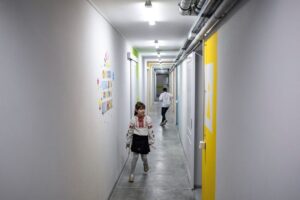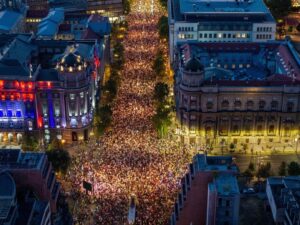GAZA, Sept. 1 (Xinhua) — September marks the start of the school year for children in many parts around the world, but for the Palestinian students living in war-torn Gaza, the prospect of returning to school this September continues to be a distant hope — just like last year.
At the entrance of a displacement camp in the central Gaza Strip city of Deir al-Balah, 12-year-old Maram sat quietly, with an old, dust-covered school bag placed beside her.
“Every year I used to go with my mother to buy new notebooks and pencils, but for three years we haven’t bought anything,” she told Xinhua in a low voice.
“I took my school bag with me, but I cannot use it anymore. At this time of year, we used to prepare to return to class, but now I only see the tent. Sometimes I write on old papers, so I don’t forget the letters,” she said.
Next to her, Ahmed, a 15-year-old tenth grader from Deir al-Balah, voiced similar frustration.
“I dreamed of becoming an engineer and building a house for my family, but everything has stopped. Since the beginning of the war, we haven’t been able to attend school. Some of my friends were killed, others displaced, and I haven’t seen them for months,” he told Xinhua.
“If more years pass without studying, what will I become? A young man without knowledge or a degree?” he asked.
Nine-year-old Layan Abu Raya, now displaced in a tent in Khan Younis in the southern Gaza Strip, said she misses her schoolyard, teachers, and friends.
“Here in the tent, we sometimes try to write on the few notebooks charities gave us, but I forget letters and sometimes write them wrong,” said the girl, who is supposed to be in the third grade of the school.
Including the three children, over 660,000 students in Gaza currently lack access to classrooms and educational materials as the war, now in its 23rd month, continues to devastate infrastructure and turn schools into shelters for displaced families, according to data released by the United Nations.
In a press statement on Monday, Philippe Lazzarini, commissioner-general of the United Nations Relief and Works Agency for Palestine Refugees in the Near East, warned that the longer the Gaza children “stay out of school with their trauma, the higher the risk they become a lost generation, sowing the seeds for more hatred and violence.”
Figures released by the Ramallah-based Palestinian Ministry of Education illustrate the depth of the crisis. It said in late August that 18,489 students have been killed and 28,854 injured since the start of the Israeli attacks on the Gaza Strip and the West Bank after the war broke out on Oct. 7, 2023.
In al-Nuseirat refugee camp in central Gaza, Abu Mohammed al-Hawwash, a father of five, expressed deep concern.
“The war destroyed schools and universities and killed students and teachers,” he said. “I fear my children will grow up without knowing how to read or write.”
Some displaced teachers are trying to fill the gap with improvised lessons, but their efforts remain limited.
Suad al-Awadi, a 35-year-old Arabic teacher who now lives in a tent in Khan Younis, told Xinhua that she gathers groups of children in the camp and tries to teach them basic reading and writing.
“Sometimes we write letters in the sand or on torn papers, and I repeat the alphabet and simple words with them, so they don’t completely forget,” she said.
Even if they are given some opportunities to attend classes, many children already face significant learning difficulties caused by the war.
“Some children cannot concentrate at all. They have lost relatives or seen their homes destroyed, and when I try to teach them letters, they sometimes cry or talk about what happened to them. Their minds are filled with fear,” al-Awadi explained.
The teachers are also experiencing tremendous pressure, as many of their colleagues have been killed and numerous others have been displaced. Despite these challenges, al-Awadi remains committed to her work.
“When a child learns to write a word or pronounce a letter, I feel like we are fighting back against hopelessness,” she said. “However, everyone here understands that lessons in the sand cannot replace proper education. These children deserve better than this.”





